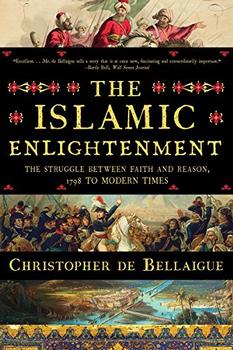Summary | Excerpt | Reviews | Beyond the Book | Readalikes | Genres & Themes | Author Bio

The Struggle Between Faith and Reason, 1798 to Modern Times
by Christopher de Bellaigue
The Muslims were not the authors of the achievements that we now associate with the Enlightenment. No Istanbul blacksmith discovered movable type. No Muslim Voltaire sniped at the clerics by the Nile. But there is a great difference between accepting that Muslim civilisation did not initiate the Enlightenment and saying that it did not accept its findings or eat of its fruit. This is a big claim to make.
It means that Muslims are either congenitally barred or – even worse – have deliberately cut themselves off from experiences that many consider to be universal. It means that the lands of Islam have remained aloof from science, democracy and the principle of equality. It is a claim that is often heard in today's divided, rebarbative, edgy world, and it is nonsense.
This book argues that an Islamic Enlightenment did indeed take place, under the influence of the West, but finding its own form. The juxtaposition of the two words may look strange, but just as it's possible to speak about the Roman and British empires while understanding that they were different in terms of organisation, ethos and economy, so we can speak about a modern 'Islamic' Enlightenment and not expect it to follow the same path as its European or American equivalent. This term evokes the defeat of dogma by proven knowledge, the demotion of the clergy from their position as arbiters of society and the relegation of religion to the private sphere. It denotes the ascendancy of democratic principles and the emergence of the individual to challenge the collective to which he or she belongs. These ideas are transferable across all systems of belief, and they have also entered the Islamic one. They are at work right now – even if they have suffered rebuffs, as we shall see.
The Western awakening has been documented with great thoroughness, but this is the first book written in English, for the general reader, that documents Islam's transformation. I have drawn on the writings of scholars, journalists and memoirists. Writing in many cases with the poignancy that comes from describing their own experience, they have shown how from the eighteenth century the world of Islam was impelled towards change – not only by Western influences, but also by rumbling, internal needs. The world of Islam was convulsed into a new age.
'World of Islam' – and yet The Islamic Enlightenment concentrates on what happened in three places in the Middle East: Egypt, Turkey and Iran. Modernisation did also of course occur elsewhere. The first constitutional monarchy in the Muslim world was established in Tunis in 1861. In India, the Mohammedan Anglo-Oriental College, founded in 1875, became one of the first higher institutions of secular learning in the Muslim world. Yet the phenomena and characters we associate with the great shifts in thought and culture existed in their most influential form in the catalysing territories of Egypt, Turkey and Iran. Just as the heart of Islam looks to Mecca, for the nineteenth and most of the twentieth century the brain of Islam looked to Cairo, Istanbul and Tehran. It was in these three dynamic and turbulent loci that modernisation, social change and revolution took place – at first in lunges that happened concurrently but more or less independently, and then as a grand interlocked transformation that altered the Muslim world.
This gradual unification of different endeavours is reflected in the structure of this book, which begins with geographically delineated parts – Cairo, Istanbul and Tehran – before dovetailing in Chapter 4, 'Vortex', which deals with the furious social changes that took place over the nineteenth century, and Chapter 5, 'Nation', which addresses the rise of the modern state. The final chapter, 'CounterEnlightenment', describes the challenge to these trends that was witnessed after World War I.
Excerpted from The Islamic Enlightenment by Christopher de Bellaigue. Copyright © 2017 by Christopher de Bellaigue. With permission of the publisher, Liveright Publishing Corporation. All rights reserved.
Your guide toexceptional books
BookBrowse seeks out and recommends the best in contemporary fiction and nonfiction—books that not only engage and entertain but also deepen our understanding of ourselves and the world around us.